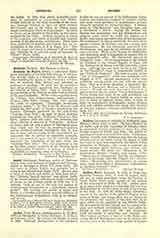

Andrea Dotti, BLESSED, b. 1256, in Borgo San Sepolcro, Tuscany, Italy; d. there August 31, 1315. He was of noble parentage, being the brother of Count Dotto Dotti, made captain of the archers of the bodyguard of Philip the Fair. Andrea grew up as many other noblemen of his time, but was ever distinguished for eminent piety as well as for courage in the field. In 1278 St. Philip Beniti delivered a sermon at the opening of the general chapter of his order in Borgo, and young Dotti was so struck by the eloquence and sanctity of the man that he at once asked to be admitted to the Servite Order. He was received by the General, and by reason of his piety and brilliant attainments was soon after ordained to the priesthood. His zeal manifested itself principally in preaching and penance. He filled various positions of honor in the Order, converted Blessed Bartholomew, and by his charity and zeal won over to the Order a large number of hermits living at Vallucola. Many visions were vouchsafed him, and he worked a great many duly authenticated miracles. After long years of preaching, he retired into a hermitage and renewed his penances, and died there. He was buried in a church of his native town. Pius VII authorized his cult.
AUGUSTINE MCGINNIS

